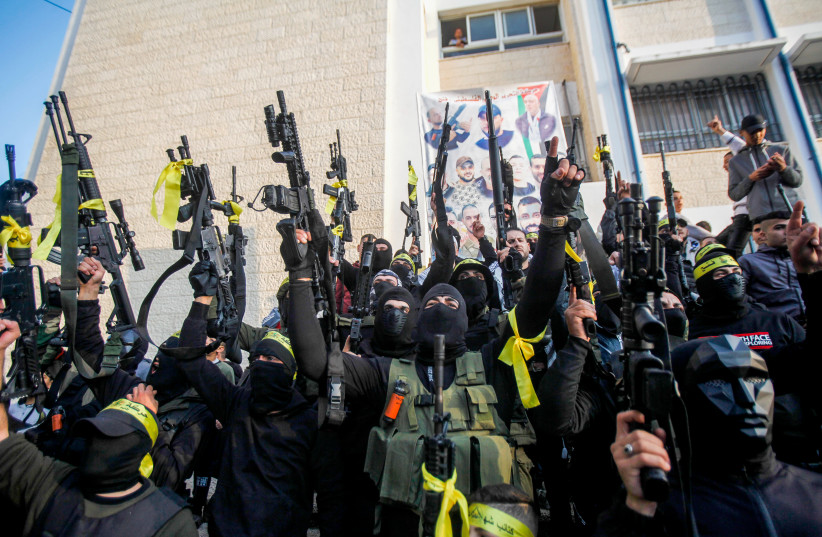IDF: Hamas factions fired Lebanon rocket barrage, Iran involvement possible

Even though the barrage into Israel was fired from Hezbollah-controlled southern Lebanon, sources indicate that Palestinian groups may be to blame.
Palestinian factions belonging to Hamas in Lebanon are responsible for the barrage of 34 rockets fired from Lebanon into Israel on Thursday afternoon, IDF spokesman Daniel Hagari confirmed.
"We are in an event with multiple theaters, but a single organization - the Palestinian factions of Hamas are shooting from Lebanon. Iranian involvement is also being examined. The state of Lebanon carries responsibility when shots are fired from within it," Hagari said.
Initial security assessments had pointed to the possibility that armed Palestinian factions in Lebanon were responsible for the attack.
According to Israeli defense officials, the rocket barrage was carried out in response to recent violent clashes between Palestinian rioters and Israeli police in al-Aqsa.
Three additional unnamed security sources told Reuters that Palestinian factions based in Lebanon, not Iran-backed Hezbollah, were behind the rocket attacks.
Fatah in Lebanon denies responsibility
An official of the Palestinian Fatah movement in Lebanon, Muhammad Buqai, denied reports that Palestinian factions were responsible for the attack in an interview with Lebanese newspaper an-Nahar.
Buqai stressed that "the prominent Palestinian factions have nothing to do with the firing of rockets that took place far away from the [Palestinian refugee] camps," pointing out that "their firing is in the interest of the internally crisis-ridden occupation."

Multiple armed Palestinian factions praised the attacks on Israel, according to the Lebanese al-Mayadeen, a Hezbollah-affiliated news organization.
The Palestinian Islamic Jihad praised the "strong, heroic response of the resistance to the enemy's crimes and aggressions," stressing that "the resistance is one unified row in the face of the Zionist enemy."
The Palestinian Mujahideen Movement stressed in their statement that the strikes "surprised the occupier and confused his calculations, and constituted a blow to the occupation's plans to monopolize Al-Aqsa and the holy areas."
The Popular Resistance Committees joined these sentiments, also linking the attack to recent events in Jerusalem's al-Aqsa mosque.
Al-Mayadeen also reported that the Lebanese army launched an investigation with UNIFIL forces to determine the launch location of the rockets that were fired toward Israel.
The Lebanese army later announced it had caught rocket launchers that were meant to be used in the attack but didn't fire, according to a KAN report.
תיעוד: חלק מהרקטות שלא שוגרו לישראל ונתפסו על ידי צבא לבנון pic.twitter.com/zqHqVhXWhU
— איתי בלומנטל Itay Blumental (@ItayBlumental) April 6, 2023
UNIFIL responded to the rocket attack in a statement on Twitter: "Head of Mission and Force Commander Major General Aroldo Lázaro is in contact with authorities on both sides of the Blue Line. The current situation is extremely serious. UNIFIL urges restraint and to avoid further escalation."
It added that the IDF had informed UNIFIL about the activation of the Iron Dome system.
ميليشيا ايران وحليفتها حماس ومحور الارهاب مصرّين انو لبنان يكون منصة اطلاق صواريخ…مصرّين يجرّوا لبنان على حروب ما الو علاقة فيها…مصرّين يدمرو ما تبقى من بلد….اذا بدن يحرروا فلسطين يروحوا هني واسماعيل هنية يحرروها من داخل الاراضي الفلسطينية، مش من لبنان…
— Nadim Gemayel (@nadimgemayel) April 6, 2023
Lebanese politician Nadim Gemayel heavily criticized Hamas and the "Iranian milita" for dragging Lebanon into a conflict with Israel. "If they want to liberate Palestine, they should go to ... Ismail Haniyeh and liberate it from inside the Palestinian territories, not from Lebanon," Gemayel said after the rocket attack on his Twitter account.
Gemayel is a member of the Christian party founded by his late father Bashir Gemayel.
Reuters contributed to this story.
